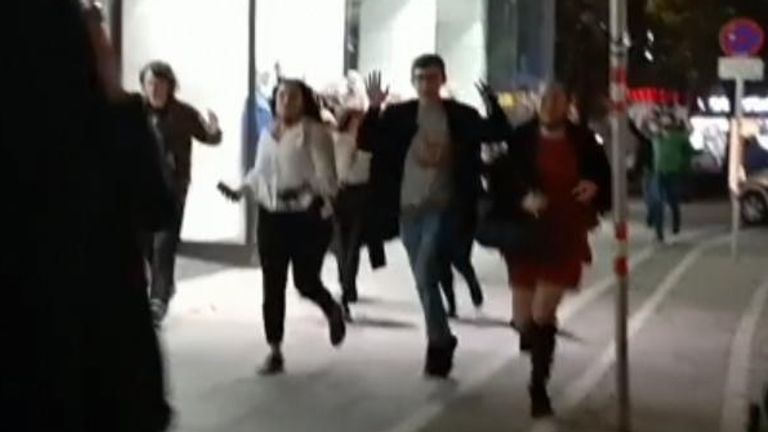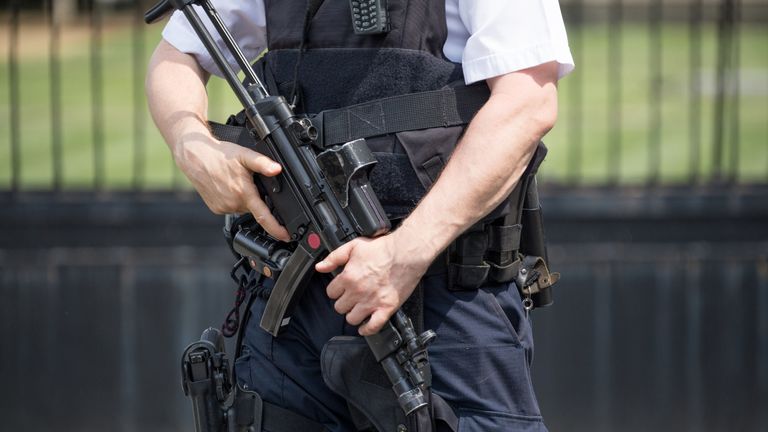The UK’s terror threat level has been raised from “substantial” to “severe”, meaning an attack is now judged to be “highly likely”.
The move follows Monday night’s attack in Austrian capital Vienna, in which four people were killed.
Last week, three people died after a knife attack in Nice, France, while teacher Samuel Paty was murdered in Paris last month.
Home Secretary Priti Patel described the action as a “precautionary measure following the terrible incidents we’ve seen in France last week and the events we saw in Austria last night”.
“The British public should be alert but not alarmed,” Ms Patel said, as she confirmed there would now be “more visible policing across the country”.
She added: “That is right in light of the threat going up, but as I’ve said, the public should not be alarmed – this is a precautionary measure.”
The home secretary urged the public to report anything of concern to police.
The decision to raise the UK’s threat level has been taken by the Joint Terrorism Analysis Centre (JTAC).
JTAC is based at MI5’s headquarters in London and is made up of counter-terror experts from the police, government and security agencies.
A UK security source told Sky News’ defence and security correspondent Alistair Bunkall that there was no specific threat to the UK but recent attacks in Europe had felt “different in tactic and tempo”, with the raised threat level a response to that.
The source added the UK has been operating at the top of ‘substantial’ for some time and it wasn’t going to take much to nudge UK into ‘severe’ category, with Vienna being that nudge.
Labour’s shadow home secretary Nick Thomas-Symonds said: “This decision should not cause undue alarm but shows the importance of people continuing to be vigilant.
“Any suspicious activity should be reported to the police or the anti-terrorism hotline.”
The terror threat level had been at “substantial” since November last year, when it was lowered from “severe” for the first time in five years.
The “severe” level is the second-highest level, with only “critical” above it – which was reached in May 2017 after the Manchester Arena bombing.
Following Monday night’s attack in Vienna, Prime Minister Boris Johnson said he was “deeply shocked”.
He added on Twitter: “The UK’s thoughts are with the people of Austria – we stand united with you against terror.”
The five terror threat levels are:
Low – an attack is highly unlikely
Moderate – an attack is possible, but not likely
Substantial – an attack is likely
Severe – an attack is highly likely
Critical – an attack is highly likely in the near future
Analysis: A sobering indication of intelligence officials’ concerns
By Mark White, home affairs correspondent
This decision is a sobering indication of just how concerned intelligence officials are about the possibility a wave of terror attacks across Europe could spread to Britain.
The threat level now stands at ‘severe’, meaning a terror attack is highly likely.
It had previously been reduced to ‘substantial’ in November 2019.
This came after intelligence analysts assessed the threat to the UK from international terrorism was still significant, but had reduced enough to suggest planned attacks were no longer highly likely.
Now, the ongoing threat facing European nations has been rapidly reassessed following multiple attacks against French interests and Monday’s marauding gun attack in the Austrian capital, Vienna.
The motivation for the latest attack is still not entirely clear, but the gunman, who was shot dead by police, has sworn allegiance to the Islamic State terror group.
The group has already called for attacks against French interests because of the French government’s robust defence of the right to publish caricatures of the prophet Muhammad.
The stance has angered many in the Muslim world, who see such depictions of their most revered prophet as grossly offensive.







